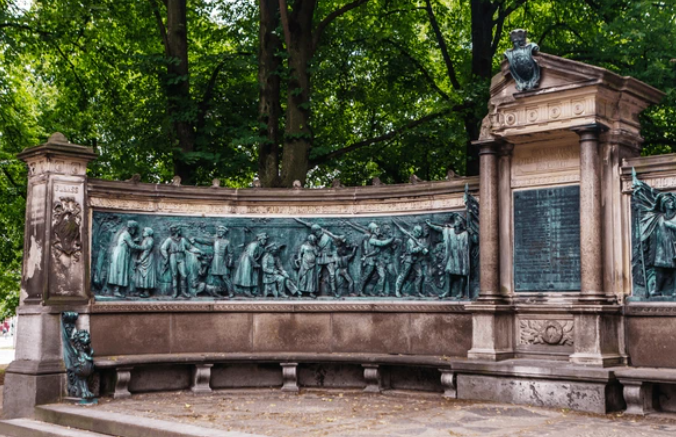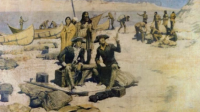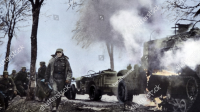Introduction: A War That Changed the Course of History
The Franco-Prussian War of 1870-1871 was a pivotal conflict that not only reshaped the map of Europe but also marked the emergence of Germany as a major continental power. This war, fought between the Second French Empire under Napoleon III and the Kingdom of Prussia, along with its German allies, was the final and most significant of the Wars of German Unification. The war’s outcome led to the downfall of the French Empire, the unification of Germany, and the proclamation of the German Empire under Kaiser Wilhelm I. The Franco-Prussian War had far-reaching consequences, setting the stage for the geopolitical tensions that would eventually lead to World War I.
Read Also : Wilhelm I Becomes King of Prussia (1861): The Beginning of a New Era
The Road to War: Tensions Between France and Prussia
The roots of the Franco-Prussian War can be traced back to the growing rivalry between France and Prussia in the 19th century. France, under the rule of Emperor Napoleon III, was a dominant power in Europe, but its position was increasingly challenged by the rise of Prussia. The rapid unification of the German states under Prussian leadership, particularly after the Austro-Prussian War of 1866, posed a direct threat to French influence in Europe.
The Ems Dispatch: Bismarck’s Diplomatic Masterstroke
The immediate cause of the Franco-Prussian War was the Ems Dispatch, a carefully edited communication by Otto von Bismarck, the Prussian Chancellor. The dispatch concerned a diplomatic incident involving a Hohenzollern candidate for the Spanish throne, which France opposed. Bismarck’s edited version of the dispatch made it appear as though the Prussian king had insulted the French ambassador, sparking outrage in France.
The Ems Dispatch was a diplomatic masterstroke by Bismarck, as it provoked France into declaring war on Prussia. Bismarck’s goal was to unify the German states against a common enemy, and he succeeded in rallying the southern German states, which had previously been hesitant to join Prussia, to the cause. The declaration of war by France played directly into Bismarck’s hands, allowing him to present Prussia as the defender of German honor and to secure the full support of the German Confederation.
The Ems Dispatch is often cited as an example of Realpolitik, Bismarck’s pragmatic and opportunistic approach to diplomacy. By manipulating the situation to provoke France, Bismarck was able to achieve his long-standing goal of German unification, while simultaneously weakening France and enhancing Prussia’s position in Europe.
The Political Climate in Europe
The political climate in Europe in the years leading up to the Franco-Prussian War was marked by shifting alliances and growing nationalism. France was seeking to reassert its dominance on the continent, while Prussia was focused on consolidating its power and unifying the German states. The rivalry between these two powers was intensified by the broader context of European politics, including the decline of Austrian influence after the Austro-Prussian War and the growing importance of nationalism as a force in international relations.
The unification of Germany under Prussian leadership was seen as a direct threat by France, which feared the rise of a powerful and united German state on its eastern border. Napoleon III, eager to maintain France’s position as the leading power in Europe, was determined to prevent the unification of Germany and to assert French dominance. However, the French army was unprepared for the scale and intensity of the conflict that was about to unfold.
The political climate in Europe was further complicated by the ambitions of other European powers, including Britain and Russia, who were closely watching the unfolding events. While Britain remained neutral, Russia was more inclined to support Prussia, seeing the weakening of France as beneficial to its own interests. The Franco-Prussian War was not just a conflict between two nations; it was a war that had the potential to reshape the entire European order.
The Military Campaign: A Rapid and Decisive Conflict
The Franco-Prussian War was marked by its rapid pace and decisive battles, which quickly turned the tide in favor of Prussia and its allies. The Prussian army, led by General Helmuth von Moltke, was well-prepared and highly efficient, while the French forces, though numerous, were hampered by poor leadership, outdated tactics, and logistical challenges.
The Battle of Sedan: A Crushing Defeat for France
One of the most significant and decisive battles of the Franco-Prussian War was the Battle of Sedan, fought on September 1, 1870. The battle resulted in a catastrophic defeat for the French army and led to the capture of Emperor Napoleon III. The Prussian forces, employing superior tactics and coordination, encircled the French army at Sedan, forcing its surrender after a brief but intense engagement.
The capture of Napoleon III was a turning point in the war, as it effectively ended the French Empire and led to the proclamation of the French Third Republic. The fall of Sedan shocked the French public and government, leading to widespread panic and the collapse of morale. The battle demonstrated the effectiveness of Prussian military strategy and the importance of modern warfare techniques, including the use of railways for rapid troop movement and the deployment of artillery in massed formations.
The Battle of Sedan also had significant political implications, as the capture of the French emperor allowed Bismarck to dictate the terms of peace and to advance his goal of German unification. The defeat at Sedan was a humiliation for France and a clear indication of the shifting balance of power in Europe.
The Siege of Paris: The Fall of the French Capital
Following the defeat at Sedan, the Prussian and German forces advanced on Paris, laying siege to the French capital in September 1870. The Siege of Paris lasted for four months, during which the city was subjected to constant bombardment and severe shortages of food and supplies. The French government, now led by the newly established Third Republic, attempted to resist the siege, but the situation became increasingly desperate.
The Siege of Paris was a grueling and demoralizing experience for the French population. Despite attempts to break the siege through various sorties and the establishment of a government in exile in Tours, the French forces were unable to lift the blockade. The harsh winter of 1870-1871 exacerbated the suffering of the city’s residents, leading to widespread starvation and hardship.
The fall of Paris in January 1871 marked the end of the Franco-Prussian War. The city was forced to surrender after months of relentless pressure, and the terms of the armistice were dictated by Bismarck. The surrender of Paris was a significant blow to French pride and marked the final collapse of French resistance. The end of the siege also signaled the conclusion of the military phase of the war, paving the way for the formal unification of Germany.
The Proclamation of the German Empire at Versailles
One of the most significant outcomes of the Franco-Prussian War was the unification of Germany and the proclamation of the German Empire. On January 18, 1871, in the Hall of Mirrors at the Palace of Versailles, King Wilhelm I of Prussia was crowned Kaiser (Emperor) of the newly unified German Empire. The choice of Versailles as the location for the proclamation was a deliberate act of symbolism, as it underscored the triumph of Germany over France.
The unification of Germany was the culmination of decades of effort by Prussia and its leaders, particularly Otto von Bismarck. The victory over France provided the final impetus for the southern German states to join the North German Confederation, leading to the creation of a unified German state. The proclamation of the German Empire marked the emergence of Germany as a major power in Europe and a key player on the international stage.
The establishment of the German Empire had far-reaching consequences for Europe. It disrupted the existing balance of power, challenged the dominance of France, and set the stage for future conflicts. The unification of Germany also marked the beginning of a new era in European history, characterized by the rise of nationalism, militarism, and imperial ambition.
The Aftermath of the War: Consequences for France and Germany
The Franco-Prussian War had profound and lasting consequences for both France and Germany. The war not only led to the unification of Germany but also had significant social, political, and economic repercussions for both countries. The legacy of the war would shape the future of Europe for decades to come.
The Treaty of Frankfurt: Harsh Terms for France
The Franco-Prussian War officially ended with the signing of the Treaty of Frankfurt on May 10, 1871. The treaty imposed harsh terms on France, including the cession of the provinces of Alsace and Lorraine to Germany and the payment of a substantial war indemnity. The loss of Alsace and Lorraine was a particularly bitter blow for France, as these regions were culturally and economically significant.
The Treaty of Frankfurt also required France to endure a German military occupation until the war indemnity was paid in full. The financial burden of the indemnity, along with the economic disruption caused by the war, had a lasting impact on the French economy. The treaty’s terms fueled a deep sense of resentment and a desire for revenge in France, which would later contribute to the tensions leading up to World War I.
The Treaty of Frankfurt was a triumph for Bismarck and the newly unified German Empire. It secured Germany’s position as a dominant power in Europe and provided the new state with additional resources and territory. However, the treaty also sowed the seeds of future conflict, as the unresolved issues and grievances from the war continued to simmer beneath the surface.
The Fall of the Second French Empire and the Rise of the Third Republic
The Franco-Prussian War led to the downfall of the Second French Empire and the rise of the French Third Republic. The capture of Napoleon III at the Battle of Sedan and the subsequent defeat of French forces undermined the legitimacy of the imperial regime. In the wake of the war, France experienced a period of political instability, culminating in the establishment of the Third Republic in 1871.
The Third Republic faced significant challenges in its early years, including the need to rebuild a nation devastated by war and the task of restoring national pride after the humiliating defeat. The loss of Alsace and Lorraine, in particular, became a rallying point for French nationalism and a symbol of the desire for revanche, or revenge against Germany.
The fall of the Second Empire and the rise of the Third Republic also had significant implications for French society. The war had exposed the weaknesses of the French military and government, leading to calls for reform and modernization. The experience of the war also deepened political divisions in France, particularly between the conservative and republican factions.
The legacy of the Franco-Prussian War in France was one of loss and humiliation, but also of resilience and determination. The Third Republic would go on to become the longest-lasting regime in French history, and its leaders would work tirelessly to restore France’s position on the world stage.
The Impact on German Nationalism and Militarism
The unification of Germany and the creation of the German Empire were sources of immense pride and celebration for the German people. The Franco-Prussian War had achieved what many Germans had long dreamed of: a unified nation-state under the leadership of Prussia. The victory over France was seen as a vindication of German strength and a symbol of the nation’s newfound power.
However, the unification of Germany also had significant implications for the development of German nationalism and militarism. The war had demonstrated the effectiveness of military force in achieving political goals, and the new German Empire was built on the foundation of a strong and powerful military. The success of the war reinforced the belief in the importance of a strong military to defend and expand the nation’s interests.
The Franco-Prussian War also contributed to the rise of German nationalism, as the newly unified nation sought to assert its identity and place in the world. The war and its aftermath fueled a sense of superiority and destiny among many Germans, leading to an increasingly aggressive and expansionist foreign policy. This militaristic and nationalist mindset would have significant consequences for Europe in the decades to come.
The legacy of the Franco-Prussian War in Germany was one of triumph and pride, but also of a growing sense of militarism and nationalism. The new German Empire was a powerful and ambitious state, determined to assert its influence on the world stage.
The Long-Term Consequences: Setting the Stage for Future Conflicts
The Franco-Prussian War had far-reaching consequences for Europe and the world. The war not only led to the unification of Germany and the decline of French influence but also set the stage for the tensions and rivalries that would eventually lead to World War I. The legacy of the war was one of both triumph and tragedy, as the new European order created by the conflict would ultimately prove unstable and unsustainable.
The Shift in the Balance of Power in Europe
The unification of Germany and the creation of the German Empire marked a significant shift in the balance of power in Europe. The new German state was a major industrial and military power, capable of challenging the dominance of both France and Britain. The rise of Germany disrupted the existing alliances and rivalries in Europe, leading to a period of uncertainty and tension.
The Franco-Prussian War also weakened France, both militarily and economically, and left the country with a deep sense of resentment and a desire for revenge. The loss of Alsace and Lorraine was particularly significant, as it became a symbol of French humiliation and a rallying point for nationalist sentiment. The desire to regain these territories would be a major factor in the lead-up to World War I.
The shift in the balance of power in Europe also had broader implications for global politics. The rise of Germany as a major power challenged the existing colonial and imperial order, leading to increased competition and rivalry among the European powers. The new German Empire was eager to assert its influence on the world stage, leading to a period of heightened imperialism and expansionism.
The Legacy of Nationalism and Militarism
The Franco-Prussian War had a profound impact on the development of nationalism and militarism in Europe. The war demonstrated the power of nationalist sentiment in mobilizing populations and achieving political goals. The unification of Germany was seen as a triumph of nationalism, and the new German Empire was built on a foundation of strong national identity and military power.
The success of the war also reinforced the belief in the importance of a strong military to defend and expand national interests. The German Empire became increasingly militaristic in the years following the war, with a focus on building and maintaining a powerful military. This militaristic mindset would have significant consequences for Europe in the early 20th century, as the arms race and the buildup of military alliances contributed to the outbreak of World War I.
The legacy of nationalism and militarism also extended beyond Germany. The Franco-Prussian War inspired nationalist movements in other parts of Europe, as people sought to create their own nation-states and assert their independence. The rise of nationalism and militarism in Europe was a major factor in the instability and conflict that characterized the continent in the years leading up to World War I.
The Prelude to World War I
The Franco-Prussian War is often seen as a prelude to World War I, as the conflict set the stage for the tensions and rivalries that would eventually lead to the outbreak of war in 1914. The unification of Germany and the creation of the German Empire disrupted the balance of power in Europe, leading to a period of heightened competition and rivalry among the European powers.
The war also left France with a deep sense of resentment and a desire for revenge, particularly over the loss of Alsace and Lorraine. This desire for revanche would be a major factor in the lead-up to World War I, as France sought to regain its lost territories and to restore its position as a leading power in Europe.
The legacy of the Franco-Prussian War was one of both triumph and tragedy. The unification of Germany was a major achievement, but it also set the stage for future conflicts and instability in Europe. The war’s impact on nationalism, militarism, and the balance of power in Europe would continue to be felt for decades to come.
Conclusion: The Enduring Legacy of the Franco-Prussian War
The Franco-Prussian War of 1870-1871 was a conflict that reshaped the course of European history. The war led to the unification of Germany and the creation of the German Empire, a state that would become a major power in Europe and on the world stage. The war also marked the decline of French influence and the rise of German nationalism and militarism.
The legacy of the Franco-Prussian War is one of both triumph and tragedy. The unification of Germany was a significant achievement, but it also set the stage for future conflicts and instability in Europe. The war’s impact on nationalism, militarism, and the balance of power in Europe would continue to be felt for decades to come, ultimately contributing to the outbreak of World War I.
The Franco-Prussian War serves as a reminder of the complex and often unpredictable nature of history. The decisions and actions taken during the war had far-reaching consequences, shaping the future of Europe and the world. The legacy of the war continues to resonate today, as we reflect on the lessons of history and the challenges of maintaining peace and stability in a complex and interconnected world.
FAQ About the Franco-Prussian War
What was the Franco-Prussian War?
The Franco-Prussian War was a conflict fought between France and the Kingdom of Prussia, along with its German allies, from 1870 to 1871. The war was a key event in the unification of Germany and led to the establishment of the German Empire.
What caused the Franco-Prussian War?
The immediate cause of the Franco-Prussian War was the Ems Dispatch, a diplomatic incident that provoked France into declaring war on Prussia. The underlying causes included the rivalry between France and Prussia, the rise of German nationalism, and the ambitions of Prussia’s Chancellor, Otto von Bismarck, to unify Germany.
What was the outcome of the Franco-Prussian War?
The Franco-Prussian War ended in a decisive victory for Prussia and its German allies. The war led to the unification of Germany and the proclamation of the German Empire, with King Wilhelm I of Prussia becoming the first German Emperor. The war also resulted in the fall of the Second French Empire and the establishment of the French Third Republic.
What were the long-term consequences of the Franco-Prussian War?
The long-term consequences of the Franco-Prussian War included the unification of Germany, the rise of German nationalism and militarism, and the shift in the balance of power in Europe. The war also sowed the seeds of future conflicts, including World War I, as the unresolved issues and rivalries from the war continued to simmer.
How did the Franco-Prussian War impact Europe?
The Franco-Prussian War had a profound impact on Europe, leading to the unification of Germany and the decline of French influence. The war disrupted the existing balance of power and set the stage for future conflicts. The rise of Germany as a major power and the growth of nationalism and militarism in Europe were key factors in the instability that characterized the continent in the years leading up to World War I.







1 comment